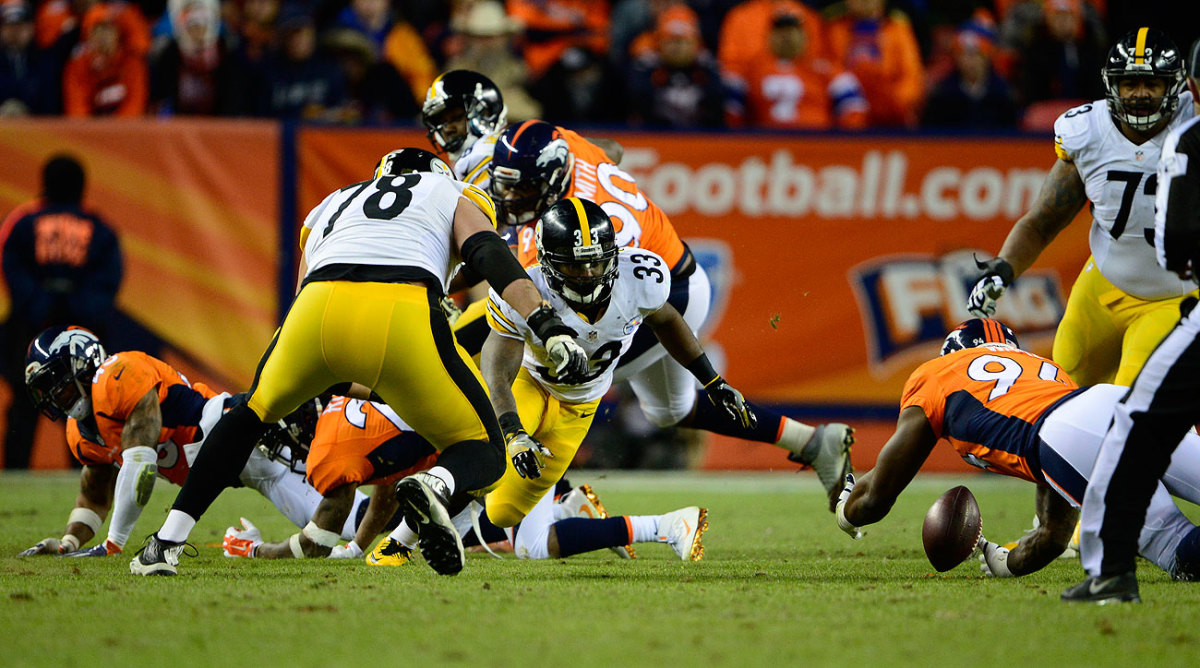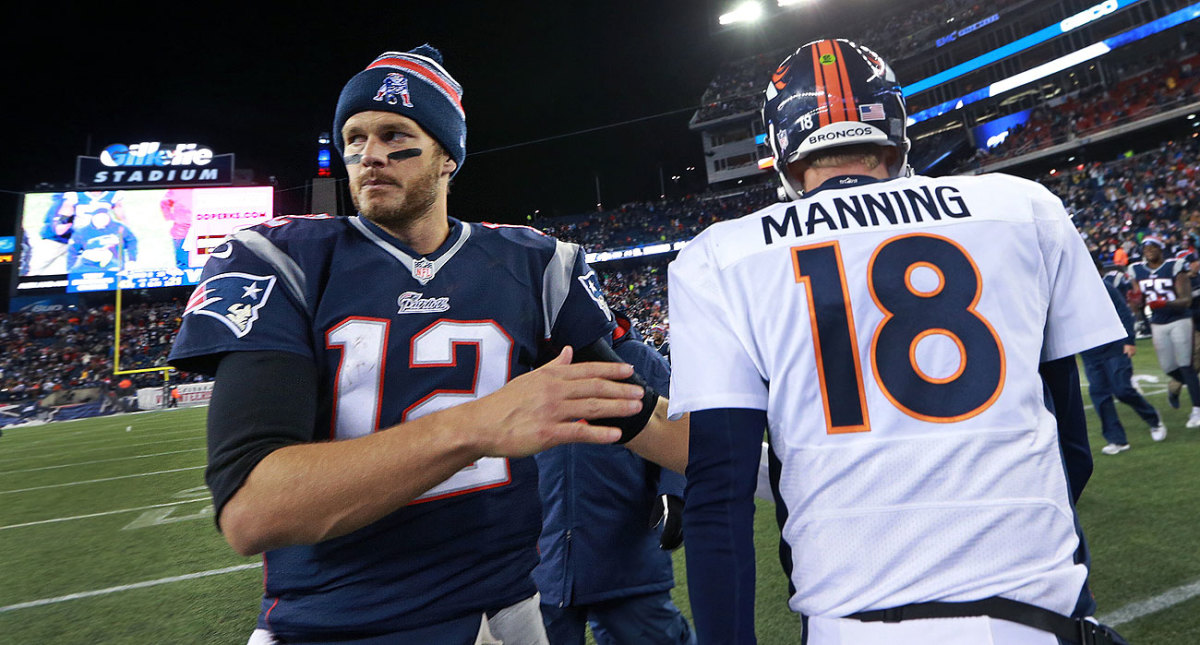Denver’s New Normal

DENVER — The sight is still hard to reconcile. On his own 39-yard line, facing the type of third-and-11 that feels insurmountable these days, Peyton Manning sailed another incompletion past Jordan Norwood to send the Broncos’ punt team back onto the field. Restlessness joined the wind whipping through Sports Authority Field. As the third quarter wound down, Denver trailed 13-12 and had failed to find a spark on offense all afternoon.
When Britton Colquitt’s punt careened off Markus Wheaton’s hands and skipped toward the goal line, there was a sense of desperation in the Broncos’ scramble for it. Even without Antonio Brown and DeAngelo Williams, the Steelers’ offense had shown more pop than Denver’s, and with the Broncos relegated to squeezing field goals out of feeble drives, one chunk play from Martavis Bryant might have been enough to put the game out of reach. The Broncos needed their game-altering play to come when they didn’t have the ball, and Wheaton’s mistake was that chance.
The muffed punt wouldn’t be it—that turned into a puzzling touchback that gave Pittsburgh an extra 20 yards of field position—but Denver did get their break a quarter later, when Bradley Roby punched the ball from Fitzgerald Toussaint’s grasp and DeMarcus Ware pounced on the fumble. After the game, Roby said he was just one of the several Denver defenders preaching the need for a turnover as the second half drew on. In the huddle, on the sideline, they knew they needed to be the ones to jumpstart the Broncos. The recovery led to Denver’s first touchdown of the game—and their first in 24 drives—but even that march relied on the legs of C.J. Anderson and Ronnie Hillman. Manning spent much of the drive under center, a clear concession that the passing game was making way for the ground attack that’s become potent over the second half of the season.
It was only two years ago that the Broncos were exploding scoreboards and putting record books through a shredder. When 2013 ended, Peyton Manning’s Broncos sat atop the list of the most prolific offenses of all time. On Sunday night the conversation about Manning couldn’t have been more removed from that image. “He managed the game right,” cornerback Chris Harris said. “No turnovers. That’s all we need.”
Peyton Manning, game manager, is tough to swallow. The numbers probably aren’t worth repeating. Manning is the most accomplished passer in NFL history, but as the Broncos prepare to face the Patriots in the AFC Championship Game, the two defining players of the NFL’s past decade and a half have assumed markedly different roles. Tom Brady continues to be the engine of a Patriots offense that remains one of the league’s best while Manning is forced to rely on the rest of his team to carry him toward the finish line. “Our defense has been outstanding all season,” Manning said. “They’ve led us to this point. Let’s make that clear.” Right now, that’s the only recipe the Broncos have, and the combination needed to make it work is a delicate balance.
* * *
By now, the Broncos have settled into their new world. Denver had to lean on its defense and running game down the stretch last season, but even then it was possible to ascribe Manning’s struggles to a hurt quad or a season full of throws. He was off from the start this season, and anyone who remembers the way Manning looked in September probably knew there would be no heroics Sunday or anytime this postseason. In laying out how his team has scraped together 13 wins in the past five months, Manning went all the way back to the opener against Baltimore, when David Bruton and Darian Stewart collaborated on an interception that turned the tide, and the next week, when Roby was again the hero on a fumble return against the Chiefs. “Different guys have stepped up at different times all season,” Manning said.

The members of the Denver defense—decidedly the league’s best all year—not only have come to understand the burden on them, but also seem to be embracing it. “We just came out and did what we do, what we’ve been doing,” Von Miller said. “It’s nothing new now.” Harris doesn’t know exactly when he realized when the Broncos’ identity shifted, but he knows it was long before now. “I’m gonna say early, man,” Harris said. “Pretty much all year, it’s been kind of like this. There have been situations all year where we had to win it on defense.”
Winning ugly is a way to win, but it’s also a way to fray a whole lot of nerves. Denver was 9-3 in games decided by a touchdown or less this season, and although nearly ever Bronco asked about that track record said it helped them stay confident in situations like they faced Sunday, Roby admitted that, “It would be nice if we didn’t put ourselves in that situation.” As points have become harder to come by, the margin for error has shrunk. Not being able to subsist on Manning’s arm has meant needing to rely on hidden contributions from unlikely sources.
Among the most vital Broncos on the field against Pittsburgh was reserve safety and, more notably, punt gunner Kayvon Webster. Over and over, Webster made plays down the left sideline to help give the Broncos a few extra yards of crucial field position, including delivering a huge shot that limited Wheaton to a one-yard return. “Kayvon Webster was the momentum giver,” Miller said. And what made Webster’s performance all the more impressive, Miller said, is that “he was sick all day, throwing up all day.”
With Denver’s offense sputtering, Webster had plenty of chances to make his mark. It would be unfair to heap all the blame on Manning’s arm. Drops plagued the Broncos throughout the first half. They let five throws slip through their hands and to the turf, and no one was immune. C.J. Anderson botched a third-down angle route that would’ve been a sure first down. Emmanuel Sanders couldn’t hold on after a big hit on a fourth down late in the first half. And Bennie Fowler had a pair of drops that stalled a series following a shanked Steelers punt.
• DENVER’S SERIOUS SIX: A statistical look at how the Broncos get the most out of their pass-rushers
Fowler would eventually get his redemption in the fourth quarter when he took a short Manning throw and broke three tackles on his way to a gain of 31. It was one of only two Denver passes that gained more than 15 yards. The other came on a play only bizarre enough for this Broncos season. Sensing pressure to his left, Manning instinctively went to the ground knees first. When no one touched him, Manning hopped to his feet, kept his eyes downfield, and found Sanders for a gain of 31. Nothing came of that Denver drive, but the sequence, to Manning’s chagrin, was still of topic of interest after the game. “I really don’t want to analyze this play too much,” Manning said, only half-joking. “I’d kind of like it to go away, if it could.”
The same could be said for much of Manning’s season. Even before a foot injury sent him to the sideline, the drop off from the quarterback we once knew to the one we were watching now had been precipitous. Manning finished second in the league with 17 interceptions, and he did it while missing six games. His interception rate of 5.1 percent tied John Skelton in 2011 for the worst season-long mark in the past five years. In the 17th matchup of arguably the two greatest quarterbacks of all time, this will be the first time when the level of Brady’s play clearly outclasses Manning’s. (Football Perspective’s Chase Stuart gave a convenient visual representation of that.)
James Harrison said it best: Manning’s value to the Broncos is “all above the neck.”
As they roll into Denver this week, the Patriots are as well positioned offensively as they have been at any point during the second half of the season. Their line is as healthy as it can be with Nate Solder gone for the year. Julian Edelman is back. And although Rob Gronkowski is hurting, it didn’t seem to matter against the Chiefs. Seventeen of Brady’s 28 completions went to Edelman and Gronkowski, and the results were a reminder of what kind of offense the Patriots can field with an arsenal that’s close to full.
Gronkowski is obviously any team’s focus when facing New England, but the Broncos might have an even bigger challenge in slowing Edelman this week. Chris Harris, a wizard as a slot cornerback, was limited to only a smattering of snaps against Pittsburgh as he continued to deal with a shoulder injury suffered in the season finale. He ceded his role in Denver’s base defense to Roby. “I just wasn’t myself,” Harris admitted. “It’s hard for me to do the things that I do.” Against a Pittsburgh offense missing Antonio Brown, the Broncos were able to survive with a Pro Bowl cornerback on the sideline. Against Edelman and the Patriots, that may not be an option. A sore shoulder could mean the difference between a trip home and a trip to the Super Bowl. When you win like the Broncos do these days, it’s life on the edge of a knife.
* * *

Greats rarely walk away with grace. The maniacal effort needed to reach and maintain that highest echelon can often have a toxic effect later in careers. Coming to terms with the current version of his game can’t be easy for Manning, and at times after the game on Sunday, the fatigue from this season was plain in his voice. “We stayed patient,” Manning said. “We didn’t get frustrated. It served us well tonight, and it served us well during the season.”
That’s where the Broncos’ offense is now. The mindset has turned from burning down defenses to powering through their struggles. The betrayal perpetrated by Manning’s body has turned him into a different kind of asset. James Harrison said it best in the locker room Sunday night. Manning’s value to the Broncos is “all above the neck.” Denver’s offense still trusts Manning to put them in the right play, even if at times he struggles to make his own.
The comfort in that is going to have to be enough this time against the Patriots. Manning versus Brady is more familiar than anything else the NFL has seen, but this time, the formula on one side is going to be drastically different from what we’ve known for so long. It’s a formula that can be potent in its own right. As the offensive line has coalesced down the stretch, the version of C.J. Anderson the world met late last season has started to reemerge, and no defense in the league is more capable.
In describing the win over the Steelers, Manning said his team “did just enough to win.” For the Broncos, it’s now just a matter of pulling that off two more times.
• Question or comment? Email us at talkback@themmqb.com.
